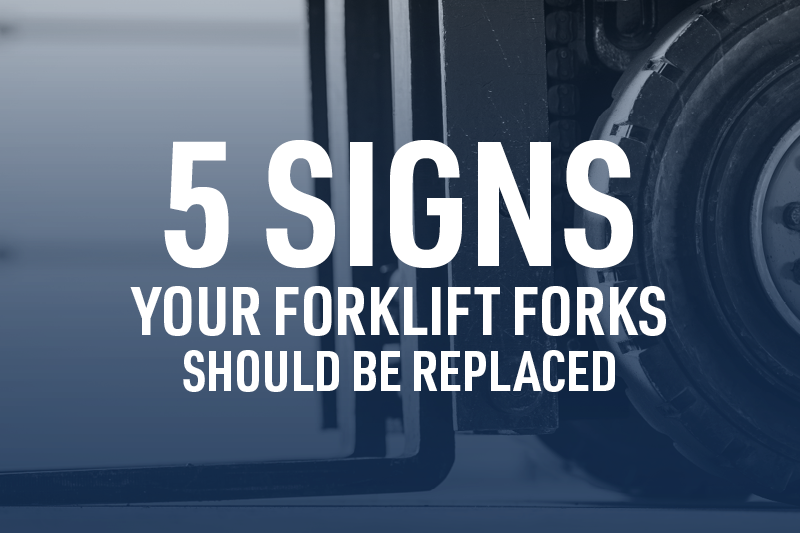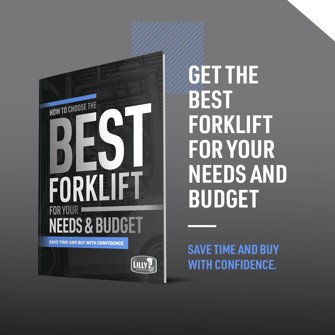
The steel forks are one of the toughest parts on a forklift. They're designed to take a lot of abuse, but they can also fail without warning.
A dropped load can cause serious injury, product damage, and expensive repairs, but the good news is: fork failures are easily preventable.
- If you have a forklift maintenance contract with The Lilly Company, breathe easy knowing we can thoroughly inspect your forklift forks during every visit.
- If your trucks do not receive regular service from a professional forklift technician, here’s what you need to check for:
How to Inspect Forklift Forks
Start by driving the forklift to a well-lit area, or grab a flashlight. You’ll also need a “go-no-go” gauge (also known as a forklift caliper) and a ruler or measuring tape.
You’re most likely to find damage close at the fork heel, the mast, and at the fork tips, but it’s important to thoroughly inspect the entire fork for cracks and gouges. If you detect damage, replace the forks as soon as possible.
Next, use the go-no-go gauge to confirm the thickness of each fork meets OSHA requirements.
- Measure the fork thickness in an area that doesn't experience wear, such as a vertical part of one of the forks.
- Compare that measurement to the thickness of the heel. If you have 10% wear or more, the fork must be replaced because it no longer has the strength to lift its rated capacity.
You can also use the gauge to evaluate whether the forks are bent or uneven. On the hinge of the gauge, there should be an angle measurement tool.
- Position the gauge above the bend of the fork.
- Open the gauge so the metal points on each leg touch the corresponding vertical and horizontal lengths of your fork (from the side, it should look like two letter ‘L’s’ stacked on top of each other).
- Check the angle measurement on the gauge, it should be very close to 90 degrees.
- A 3-degree deviation is acceptable; beyond that, the fork must be replaced
- Repeat the process on the other fork.
Next, measure the distance between the tip of each fork and the ground. The fork tips should be 1/ 4" - 3 /8" off the ground and within 3 percent of each other.
Forklift forks should be as close to identical as possible for safety reasons. If one fork is excessively bent or worn, replace both and have a conversation with your operators about forklift safety (and consider retraining). If the forks aren’t wearing evenly, that’s a sign of improper use.
Lastly, check the fork hook and positioning lock.
- Confirm the positioning lock works properly. If it doesn't, take the forklift out of service until it can be replaced. This is a serious safety hazard.
- Inspect the fork hook for wear and make sure the hook doesn’t create a gap between the fork and the carriage. If it does, replace the hook.
How Often Must Forklift Forks Be Inspected?
Operators should visually inspect forks before every shift, and thorough inspections (as described above) are required annually for single-shift operations per ANSI/ITSDF standard B-56.1. Multi-shift operations should consider quarterly inspections.
If you've ever seen operators let the forks touch the ground or use the forks for pushing or prying, there’s a good chance your forks have damage. Don't wait until the unthinkable happens. Make time to inspect your equipment.
- The forklift's forks should be at least 1/4" off the floor with the mast is in a vertical position.
- If you find a crack, bend, or other damage, contact your forklift service provider.
- Don’t try to bend, weld, or repair the forks yourself.
Forklift Forks and Forklift Service Across the Mid-South
Don't risk a serious incident caused by a highly preventable problem. The certified forklift service techs at The Lilly Company can inspect your forks and provide other essential maintenance on-site at your facility. We service all forklift makes and models.
The Lilly Company serves customers throughout Alabama, Mississippi, Tennessee and eastern Arkansas. We have a massive inventory of forklift parts, including replacement forks for nearly any application, make or model including:
- Fork extensions
- Standard ITA forks
- Spark-retardant Forks
- Shaft-mounted forks
Request forklift service online, call us 844-LILLYCO (1-844-545-5926), or connect with us at one of our 13 locations across the Mid-South.
Arkansas – Jonesboro
Alabama - Birmingham, Dothan, Irondale, Madison, Mobile, and Montgomery
Mississippi - Tupelo and Richland
Tennessee - Jackson, Kingsport, Knoxville, and Memphis
Further Reading:
Forklift Brakes: What You Need to Know
Why Are My Forklift Tires Wearing Down So Quickly?
Forklift Battery Basics
Posts by Tag
- Forklift (68)
- Forklift Service (21)
- Electric Forklifts (19)
- Forklift Safety (16)
- Warehouse Automation (14)
- Forklift Attachments (12)
- Product Review (12)
- Toyota Forklifts (12)
- Warehouse Planning (11)
- Parts (10)
- Clark Forklifts (9)
- Customer Solutions (9)
- Pallet Racking (8)
- Forklift Rental (7)
- Loading Docks (7)
- Material Handling Education (7)
- Purchasing Options (7)
- Aerial Equipment (6)
- Forklift Batteries (6)
- Forklift Accessories (5)
- Forklift Tires (5)
- Heavy Equipment (5)
- Forklift Fleet Management (4)
- Forklift Training (4)
- Pallet Jacks (4)
- Products (4)
- Utility Vehicles (4)
- Yard Spotter Trucks (4)
- Komatsu (3)
- Linde (3)
- Specialty Forklifts (3)
- Used Equipment (3)
- Warehouse Doors (3)
- Custom Shop (2)
- IC Forklifts (2)
- Manitou (2)
- COMBiLift (1)
- Forklift Brakes (1)
- Forklift Warranty (1)
- Gehl (1)
- Recruitment (1)









